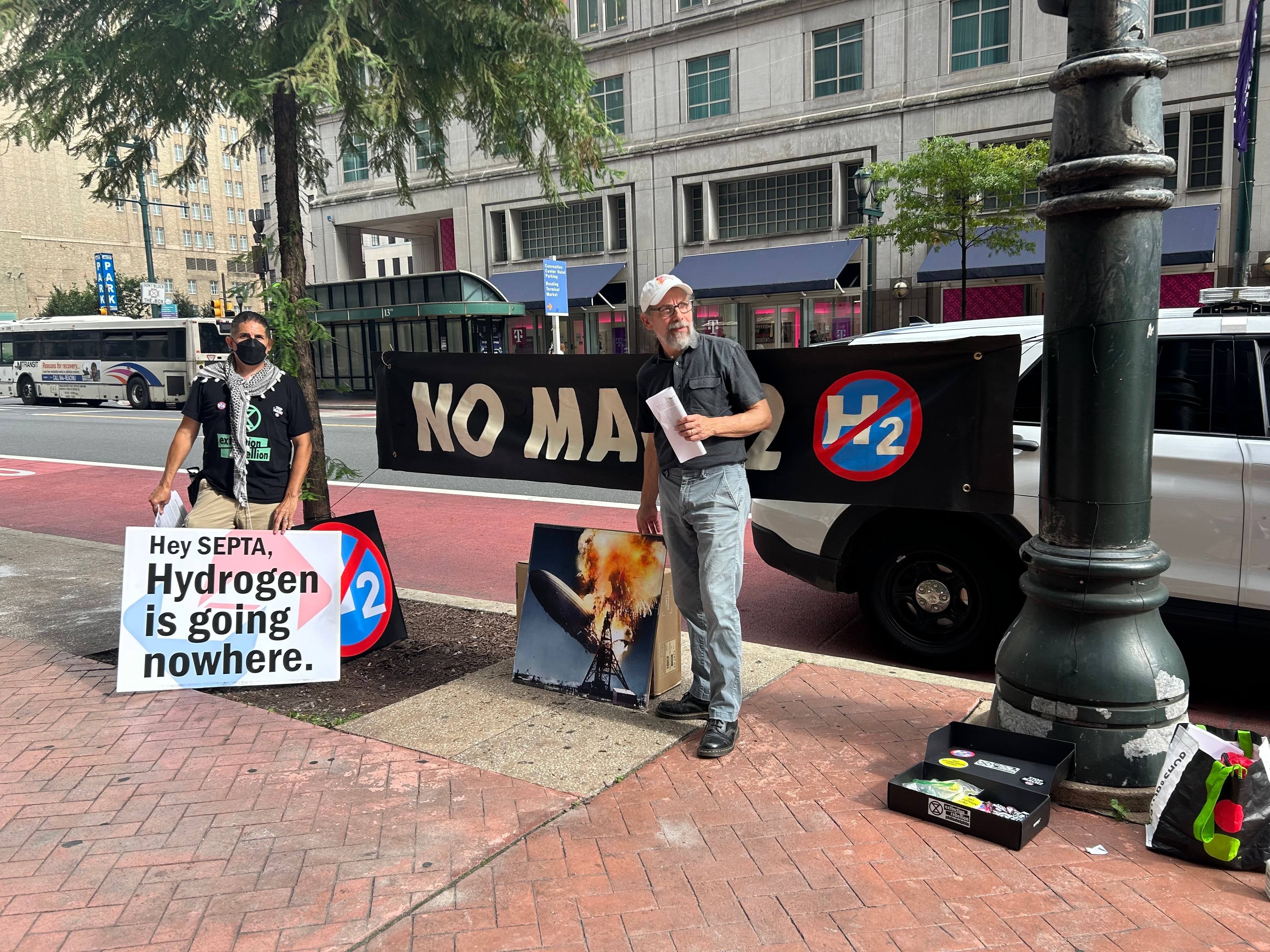Bussiness
‘Exclusionary’: Activists criticize hydrogen hub networking event in Philly

From Philly and the Pa. suburbs to South Jersey and Delaware, what would you like WHYY News to cover? Let us know!
A few dozen people in business attire gathered over bagels and coffee at the SEPTA headquarters in Philadelphia on Tuesday, eager to promote and discuss the proposed Mid-Atlantic Clean Hydrogen Hub, or MACH2.
Outside the networking event, however, a handful of environmental activists wary of the project held signs reading, “Hydrogen is going nowhere” and “No MACH2.”
“You have to pay to get into the meeting,” said Eric Moss, an activist with the activist group Extinction Rebellion. “This is a closed-door meeting.”
To some, the event contradicted the “culture of collaboration” and “shared-decision-making with stakeholder communities” MACH2 leaders promised in their application for federal money.
“They are exclusionary,” said Tracy Carluccio, deputy director of the Delaware Riverkeeper Network, who paid to get in. “They are keeping the public out.”
The Mid-Atlantic Clean Hydrogen Hub, known as MACH2, is a proposed network of projects, subsidized with federal money, that would produce, process and use hydrogen in place of planet-warming fossil fuels at various locations throughout southeastern Pennsylvania, South Jersey and Delaware.
It’s one of seven hubs across the country that the U.S. Department of Energy announced last year could receive a total of $7 billion from the Bipartisan Infrastructure Law. MACH2 is set to receive $750 million but is still in negotiations with the federal government over the award. A planned hub in western Pennsylvania, West Virginia and Ohio, ARCH2, finalized its agreement this week.
MACH2 officials said the series of monthly networking events are geared specifically to the business community and are not a replacement for broader community engagement. They said no decisions are made during these meet-ups — beyond possible private business-to-business deals — and no new information about the hub is shared.
Boosters say MACH2 would supply a fuel source free of climate pollution to hard-to-electrify industries — like steel and chemical manufacturing — while leveraging the region’s old fossil fuel infrastructure to create thousands of new jobs.
Burning hydrogen does not release planet-warming emissions. But when fossil fuels are used to make hydrogen, the process contributes to climate change.
Currently, almost all hydrogen produced in the U.S. is made using natural gas.
But companies producing hydrogen as part of MACH2 would use mostly solar or wind energy, officials say. A smaller amount would be created using nuclear power or biogas.
The broad outlines of the projects that would make up the hub — such as generation of hydrogen using nuclear power at the Salem-Hope Creek complex and use of hydrogen to power boilers at the Monroe Energy refinery near Marcus Hook — are “pretty well set,” said Manny Citron, vice president for partnership and community engagement with MACH2, the group coordinating the hub.
The first phase of hub planning, which could kick off as early as next month once the award agreement is signed, will include more detailed planning of the projects, community engagement and some engineering, officials say. An important part of winning that award are stringent requirements by the DOE for public engagement that the agency says must go beyond one-way communication of settled plans.
But critics say hub officials are already failing to be transparent and to meaningfully engage with communities where elements of the hub could be built. It’s a similar criticism that’s been lobbed at other hubs across the country, including one in California that advocates accuse of secrecy and leaving potentially impacted communities out of planning — despite a promise from the Biden administration that 40% of the benefits from the hubs will flow to disadvantaged communities that have faced underinvestment and been overburdened by pollution.
“From the beginning of MACH2, environmental justice has not been invited to the table,” said Dora Williams, an organizer with Delaware Concerned Residents of Environmental Justice who lives along Delaware’s Route 9 corridor, where the EPA has said industrial pollution raises residents’ risk of cancer. “We were not invited to the table for decision-making.”










